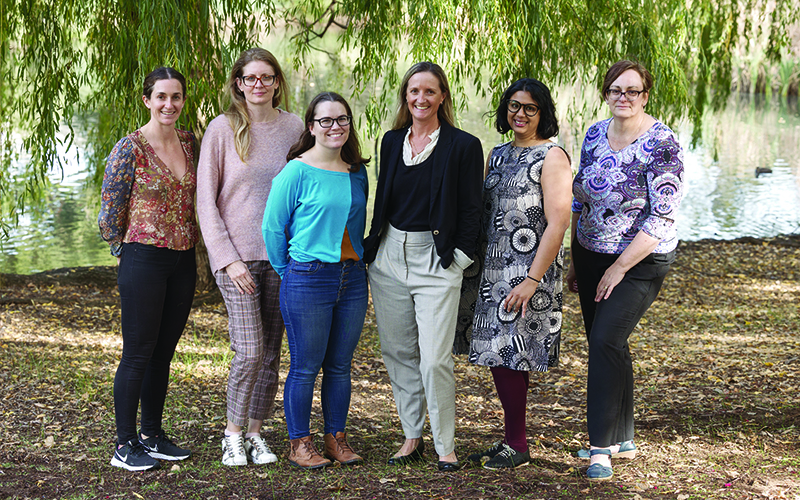
Associate Professor Hayley Christian (third from right) and the team behind the Play Active program
Childcare centres have flocked to take up a new evidence-based policy which will help ensure young children get more of the physical activity they need to be healthy and developmentally on track.
Young children need at least three hours of physical activity a day to be healthy and developing well – but only a third of Australian children aged 2–5 years are getting the recommended dose.
Now, researchers led by Professor Hayley Christian are working with childcare centres to help children establish good physical activity habits early in life – leveraging years of research to come up with a comprehensive physical activity policy which will show them how.
“Physical activity is essential for children’s health and development and is a really important behaviour to establish early on in life, but few young children are getting the daily physical activity they need,” Associate Professor Christian said.
“We know that kids need at least three hours of physical activity per day, preferably more, to be healthy and developing well.
“This should include lots of short, sharp bursts of energetic play throughout the day – physical activity that makes them huff and puff – as well as light intensity active play and lots of different types of explorative, imaginative active play.”
Professor Christian said that even though childcare centres were required to meet national quality standards around physical activity, many early childhood educators weren’t sure of the recommendations, let alone how to ensure they are met.
“We saw a real need for evidence-based guidance, training and support and that’s what we’ve sought to address in developing the Play Active program,” she said.
Developed by The Kids researchers in collaboration with 10 partners across government, not-for-profit, the private sector and academic institutions, the Play Active pilot was launched in December 2020.
“Since then we’ve had more than 200 expressions of interest from child care services and we now have 80 centres on board for an evaluation, or pragmatic trial of the policy,” Associate Professor Christian said.
“It’s been an incredible response to the program launch. We actually had to draw the line because we’ve only got so much capacity and resources to run the evaluation.”
Centres who signed up have been randomly allocated to receive the Play Active program immediately or continue with their current practices and be waitlisted to receive the program later this year.
Those who receive the program immediately will be assessed and supported to modify and then implement the policy with their staff and parents. Once they’ve adapted the policy for their own needs – and it’s been signed off by the Play Active research team to ensure it retains key recommendations – they get access to training and a resource guide.
Centres will have three months to implement the policy before being reassessed.
“It’s not a big period to take on a new policy and then try and implement it – policies sometimes take years to be implemented and have a meaningful impact – but we hypothesise that within those three months we’ll see some positive changes, at least in educators’ practices around promoting physical activity in the centre,” Associate Professor Christian said.
She said the pragmatic trial approach – combined with work being done by two PhD students to look at how centres in regional and remote areas may differ in their needs – enabled childcare centres and researchers to see the policy in action and identify where it might need to be tweaked.
“This evaluation is going to help with understanding the key ingredients we need to keep the same, and what needs to be adapted to allow Play Active to be expanded to other parts of WA, and potentially other states, as well as to other types of early childhood education and care providers, like family day cares or out of school care services.
“It’s only the first step. Ultimately, we’d like Play Active to be used by multiple early childhood education and care providers nationally. We know it’s doable with the support of our current and future partners.”
Since this article was published, Play Active has now been scaled nationally!
